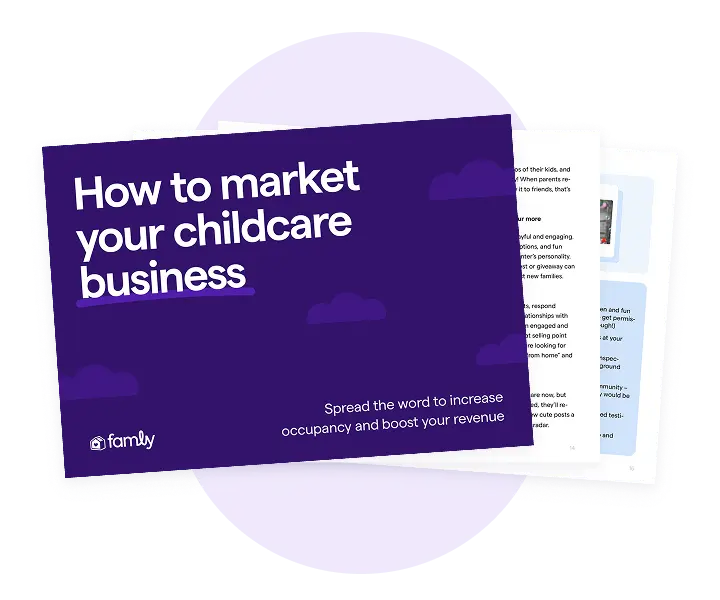settings
children
With Famly since
The other day, I was talking with Mark Davilus from Cool Clique, and we started talking about the importance of educating early childhood staff about security awareness, and providing resources for them to share with their staff members. Instantly I knew I needed to have an article on this. So here we are. Let’s jump in.
If you read our recent article on preschool social media ideas, then you know we’re a big believer in the power of social media to engage families with your center - both currently enrolled families and prospective families.
But let’s be real: staying on top of posting, replying to comments, and managing messages takes time. And directors? You’ve already got plenty on your plate. The good news is, social media is one of those jobs you can happily hand over to a trusted staff member, or a dedicated partner (like Cool Clique!).
To make sure you feel confident when you do, Mark and I wanted to share some easy-to-follow guidelines, or social media policies, to keep everyone safe, professional, and proud of what you’re sharing online.
P.S. Many of these tips are also useful if communicating with your childcare center’s internal communication app (like Famly).

Policies and best practices for childcare social media marketing
1. Parental consent comes first
Always get written permission from parents before posting photos or videos of children. It’s the simplest way to give families peace of mind, and keep your preschool safe from potential legal issues. (P.S. If you’re using Famly, you can collect and save these permissions directly in the child’s profile. No more post-its scattered around.)
2. Skip personal details
Never include children's full names, ages, birthdays, home addresses, or any other information that could identify them.
3. Maintain professional tone
Social media posts should never include jokes, sarcasm, or language that could be misinterpreted. Professionalism helps build trust with families and the community.
(P.S. With Famly’s Sidekick Writing Assistant, you can be certain that your tone is always professional and friendly)
4. Think group shots and clever angles
Capture the joy of learning without zooming in on one child’s face. Over-the-shoulder angles, hands at work, or group activities still show learning and fun without compromising individual privacy.
The big ideas

5. Post later, not in the moment
Sharing in the moment might be tempting, but wait until after the activity. That way, no one can figure out exactly where your children are at any given time - especially if you’re outside or on a field trip.
6. Double (or triple!) check all content before posting:
Before hitting publish, have another staff member take a look over the post. This provides an essential layer of oversight to catch any slip-ups.
7. Educate staff on digital footprints:
Make sure whoever’s running your accounts knows that what goes online often stays online. Training should feel empowering, not scary — more like: “Here’s how to share the amazing things we do, while protecting our community.”
8. Monitor followers, comments and direct messages:
If your account is private, you’ll need to approve followers - and that’s a good thing. Check comments and messages regularly so you can answer questions quickly (and remove anything inappropriate right away).
9. Keep accounts extra secure
Strong passwords, two-factor authentication, and limiting login access to just the right people will keep your accounts safe from accidental or unwanted posts. And be sure not to share accounts with multiple employees.

10. Remember: not every post needs kids in it
Parents love seeing your staff, classrooms, themes and decor, creative setups, sensory bins, or even the books you’re excited to read at circle time. These posts show off your teachers’ thoughtfulness and the quality of your care without relying on children’s faces.
11. Provide context with captions
A picture of a sensory bin is nice. But a caption explaining that it’s building fine motor skills or encouraging imaginative play? That’s golden. It shows families the why behind your activities. After all, childcare is not just daycare. Your staff are building children’s cognitive, academic, and social skills!
12. Keep your responses general
When parents comment, avoid talking about individual children in public threads. For anything personal, take it to a private message or face-to-face conversation.
Other ways to prioritize the children’s safety and security on social media
- Host a privacy information class for parents and talk about what you do to keep their kids safe online when they are posting on their own social media.
- Hire a consultant (like Mark!) to audit your systems for security
- Keep a handy checklist for staff on the “Dos and Don’ts” of social media at your school
- Include your specific social media policy in your staff handbook and in your parent handbook to set expectations for everyone from day one
The bottom line
Social media is an amazing way to showcase your preschool, but children’s safety and privacy always come first. With these guidelines, you can hand over the reins with confidence, knowing your staff are celebrating the learning and joy in your center in the safest way possible.
Free downloadable Early Childhood resources
Explore our library of longer-form books, guides and editable templates - all free to download.
Explore free resources




.webp)




